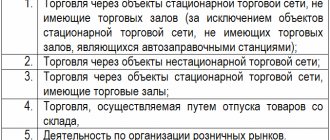The costs of entrepreneurs and organizations associated with obtaining intangible services attract increased attention from regulatory authorities. The “dangerous” category in tax accounting includes costs for information and consulting services. The essence of the problem is the difficulty of preparing an evidence base that the consultation actually took place, was useful, and the cost paid was justified.
Question: An employee of an organization has been on maternity leave for more than two years. At home, she provides consulting services on tax and accounting and has been applying NAP since 2022 (Moscow). Does she have the right to provide such a one-time service to the employing organization as part of the NAP? View answer
Information and consulting services
There is no single legal definition of consulting or information services in Russian legislation. The Tax Code does not disclose terminology, but provides a classification of intangible services (Article 148):
- consulting;
- legal;
- accounting;
- engineering type of services;
- provided by auditors and audit firms;
- marketing;
- research nature;
- experimental design variety.
Question: How to reflect in the accounting of the performing organization the revenue from the provision of consulting services on the terms of a commercial loan (deferred payment), issued by the customer issuing his own promissory note with a maturity date on a certain day? View answer
Consulting involves providing the client with ready-made information. The scope of application of this information can be any. The provision of information services assumes that information on the desired topic will be collected, systematized, summarized, and analyzed. The result of this set of actions will be the issuance of finished information products.
FOR REFERENCE! Consulting and information services may be provided orally or in writing.
Civil law classifies consulting and information services as paid contractual relations (Article 779 of the Civil Code of the Russian Federation). It is assumed that the customer of services enters into an agreement with the contractor (consultant). After completing the actions stated in the agreement, a monetary settlement is made between the parties, with the customer acting as the payer.
Is it possible to take into account the costs of consulting services on the simplified tax system ?
Who needs accounting consulting services
Such consultations can be used by most people involved in accounting: from the owner of the company to the chief accountant. That is, even if there is already a specialist on staff, consultations may be useful. A third-party expert will monitor the accountant’s work, identify errors, and advise methods for optimizing processes within the company, which will help improve the efficiency of operations as a whole.
Most often, the services of consulting companies are used by:
- an organization whose employees do not have the necessary qualifications;
- a company whose accountants were faced with a non-standard task;
- business owners who independently maintain financial records.
Therefore, accounting consulting services are a good solution for small and medium-sized businesses. However, in case of complex and atypical problems, it may also be necessary to consult large companies. Such support allows you to insure yourself against errors, penalties, and unlawful actions of personnel or government bodies.
Accounting services
Accounting and tax accounting
For accounting purposes, costs associated with consulting or obtaining information services must be shown according to the rules of PBU 10/99. Accounting standards classify this type of costs as expenses from ordinary activities (clause 7 of PBU 10/99). They are accumulated in the debit of account 26 or 25, 20, 44, 91 (depending on the nature of the service and the topic of the consultation, on the purpose for which this information is required). Accounting is carried out with participation in the correspondence of account 60. Recognition of costs occurs in the period when the services were actually received. Linking a transaction to the date of payment is not practiced.
In tax accounting there is no unambiguity in the recognition of information and consulting services. The Ministry of Finance indicates that these costs can be taken into account when calculating the size of the tax base for income tax (Letter No. 03-03-06/1/49967 dated 10/06/2014). The Ministry of Finance recommends that the cost of legal, information, consulting and other types of intangible services be included in other expenses that are associated with production and sales activities. The date of recognition of costs is tied to the date of settlement or receipt of documentation for subsequent settlement. It is also allowed to focus on the last day of the reporting period (p. 272 of the Tax Code of the Russian Federation).
IMPORTANT! The Ministry of Finance clarifies that the cost of such services can be included in expenses under one condition - the business entity can prove the validity of the expenses and document the fact of receiving the service.
The fact of provision and receipt of services is verified by the tax authorities through an assessment of the reality of the concluded transaction (checking the location of the organization that provided the services, their contact phone numbers, compliance of signatures in the acts). Primary documentation for business transactions can be recognized as justifying if the execution of the forms complies with legal standards (there is a complete list of mandatory details, the contents of the document coincide with the nature of the service provided).
How to take into account consulting services when calculating income tax ?
In contracts and acts it is necessary to provide a detailed breakdown of the services provided. The use of general language (legal services or information and consulting support) is not a basis for recognizing supporting documentation as valid. In court, if there is no detail on services, the contract may be classified as unconcluded. The reason is:
- the impossibility of identifying the list of issues on which consultation was provided;
- unclear definition of the time range for performing services;
- the absence of signs by which one can trace the purpose of contacting consultants.
If the contract and act do not detail the services, this set of documents must be supplemented with a certificate or report drawn up in any form. They describe in detail the nature of the services and their composition. Along with acts, invoice forms and consultation protocols can act as primary supporting documentation.
To accept the VAT amount for deduction, you must have an invoice (registration is regulated by Article 169 of the Tax Code of the Russian Federation). The justification for the need to obtain specific services should be based on their direct impact on the company's performance. Tax authorities defend the position that expenses are unreasonable if, after their implementation, the enterprise does not have income
IMPORTANT! All costs recognized in tax accounting must have a direct impact on the amount of income received.
A dispute with regulatory authorities is possible if the content of the services provided by third parties coincides with the job functions of one of the company’s full-time specialists. For example, a company has a lawyer on staff, but the position is not vacant. If the management of the company turned for legal advice not to its specialist, but to another organization or individual, then the costs incurred in connection with this will not be justified. It is necessary to avoid duplication of duties of regular staff with intangible services.
Judicial practice proves that the position of tax authorities on the issue of justification of expenses can be successfully challenged. Court decisions indicate that only the business entity itself can assess the effectiveness of the resources spent. The reason for inclusion in the expense tax base can be either an actual increase in income associated with incurred costs, or an intention in the future to receive additional material benefits or to eliminate the occurrence of losses.
Intangible
For simplifiers, there is a closed list of costs by the amount of which the tax base can be reduced. Their list is recorded in Art. 346.16 Tax Code of the Russian Federation. Consulting services are not mentioned in this section of the Tax Code. The impossibility of offset in calculating tax according to the simplified tax system is confirmed in letters from tax authorities (for example, Letter of authorship from the Federal Tax Service of the Russian Federation for Moscow dated December 19, 2007, No. 18-11/3/ [ email protected] ).
There may be several exceptions to this rule:
- The company that received information services specializes in consulting (the provision of intangible information services is its main activity). Expenses should be included in material costs.
- Auditing, accounting or legal advice. If a dispute arises with the Federal Tax Service regarding audit information support, it is necessary to justify your position in clause 2 of Art. 1 of the Law of December 31, 2008 No. 307-FZ (in this part, the law defines that audit services are not only an audit, but also related services).
Intangible services under the simplified taxation system “income minus expenses”
For entrepreneurs, the simplified tax system has a closed list of costs, by the amount of which they have the right to reduce the tax base. You can study this list by referring to Art. 346 of the Tax Code of the Russian Federation, and consulting services are not mentioned there. Therefore, you should not expect that consultations can be deducted from the tax base. However, there are several exceptions to this rule:
- The company specializes in consulting, and the provision of information services is the main focus of its work. In this case, the costs are classified as other material costs.
- Consulting on auditing, accounting and legal issues. In relation to audit support, your position can be substantiated by referring to clause 2 of Art. 1 of the Law “On Auditing Activities”. It determines that audit services also include related work and consultations, not just the audit itself.
VALEN specialists have many years of experience in the field of accounting and tax consulting services. We provide legal support to small and large businesses, individual entrepreneurs and individuals; our company cooperates with Russian enterprises and foreign organizations that do business in the Russian Federation.
To get a consultation, you can leave a request on our website or call: +7 (495) 7-888-096. We are also waiting for you in our office in Moscow.
Typical correspondence
In accounting, the receipt of information or consulting services should be reflected regardless of their impact on operating results. Each transaction and payment must be shown in accounting by postings, even if they cannot be taken into account in tax accounting. When receiving an intangible type of service, an enterprise receives it, after which it has an obligation to the counterparty. It can be repaid in cash or non-cash form.
Typical correspondence in the segment of accounting for intangible services:
- D26 (or 20, 25, 44) – K60 – designation of the fact of acceptance for accounting of auditing, legal or other services related to information processing and professional consulting.
- D19 - K60 - the amount of VAT included in the invoice for payment of services is highlighted.
If the company does not plan to include the costs incurred in the tax base to reduce it, then it is recommended to open an analytical sub-account for account 26: costs that do not reduce the taxable amount of profit. This rule is relevant for cases where the consulting services received are duplicated by the functional responsibilities of full-time employees.
VAT
There is no place without VAT today, including in education. Educational services (commercial) are taxed at the standard rate (20%). Employers who have paid VAT have the right to claim it for deduction under certain conditions (RF Tax Code, Art. 171). If the invoice for the provision of educational services does not highlight the tax or indicates it incorrectly, if the act on the provision of services contains errors or is completely absent, it will not be possible to claim VAT for deduction.
Certain educational services are not subject to taxation. An accountant of a consulting company training its employees should take this into account. If the latter undergo advanced training or retraining in an NPO of the appropriate profile, VAT is not charged, not paid and, accordingly, is not claimed for deduction (Tax Code of the Russian Federation, Art. 149). But if the educational services of NPOs are not licensed, are provided in the format of one-time seminars, lectures, master classes, and do not provide for the issuance of documents on completion of training, the tax is calculated and paid in the general manner. The consulting company can subsequently present it for deduction.
Accounting for the costs of training employees abroad is a separate topic. The process has many nuances and certain specifics. Much depends on whether the educational institution (service provider company) is a tax resident of the Russian Federation or not.
Types of accounting consulting services
Often the list of services is quite large. Companies offer them in various interaction formats: one-time consultations, periodic problem solving or subscription consulting services.
Among them the following types are distinguished:
- development of the company's accounting policy;
- setting up accounting and tax accounting processes;
- clarification on filling out reporting documentation;
- assistance in calculating employee salaries, calculating taxes and insurance premiums;
- control of accounting activities;
- assistance in preparing for tax audits;
- support of inspections;
- and others.
Accounting







